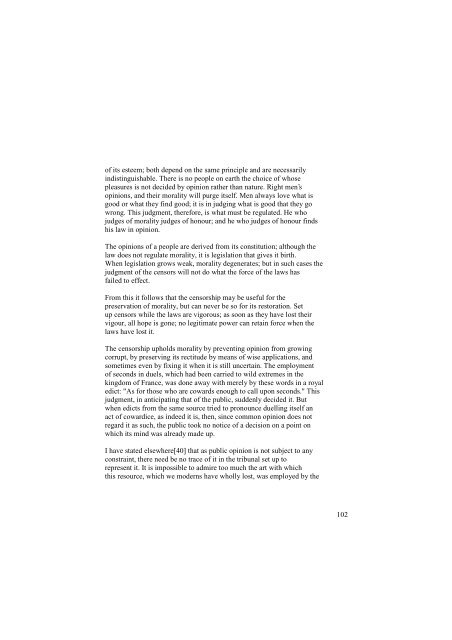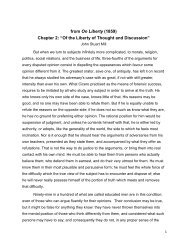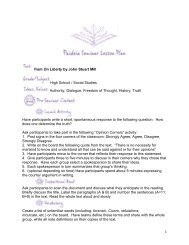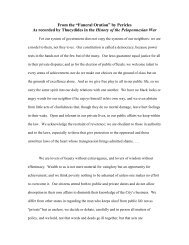Rousseau_contrat-social
Create successful ePaper yourself
Turn your PDF publications into a flip-book with our unique Google optimized e-Paper software.
of its esteem; both depend on the same principle and are necessarily<br />
indistinguishable. There is no people on earth the choice of whose<br />
pleasures is not decided by opinion rather than nature. Right men’s<br />
opinions, and their morality will purge itself. Men always love what is<br />
good or what they find good; it is in judging what is good that they go<br />
wrong. This judgment, therefore, is what must be regulated. He who<br />
judges of morality judges of honour; and he who judges of honour finds<br />
his law in opinion.<br />
The opinions of a people are derived from its constitution; although the<br />
law does not regulate morality, it is legislation that gives it birth.<br />
When legislation grows weak, morality degenerates; but in such cases the<br />
judgment of the censors will not do what the force of the laws has<br />
failed to effect.<br />
From this it follows that the censorship may be useful for the<br />
preservation of morality, but can never be so for its restoration. Set<br />
up censors while the laws are vigorous; as soon as they have lost their<br />
vigour, all hope is gone; no legitimate power can retain force when the<br />
laws have lost it.<br />
The censorship upholds morality by preventing opinion from growing<br />
corrupt, by preserving its rectitude by means of wise applications, and<br />
sometimes even by fixing it when it is still uncertain. The employment<br />
of seconds in duels, which had been carried to wild extremes in the<br />
kingdom of France, was done away with merely by these words in a royal<br />
edict: "As for those who are cowards enough to call upon seconds." This<br />
judgment, in anticipating that of the public, suddenly decided it. But<br />
when edicts from the same source tried to pronounce duelling itself an<br />
act of cowardice, as indeed it is, then, since common opinion does not<br />
regard it as such, the public took no notice of a decision on a point on<br />
which its mind was already made up.<br />
I have stated elsewhere[40] that as public opinion is not subject to any<br />
constraint, there need be no trace of it in the tribunal set up to<br />
represent it. It is impossible to admire too much the art with which<br />
this resource, which we moderns have wholly lost, was employed by the<br />
102











